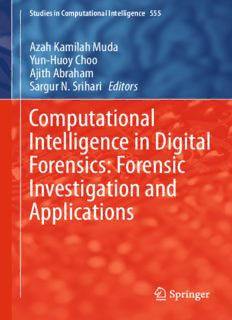Table Of ContentStudies in Computational Intelligence 555
Azah Kamilah Muda
Yun-Huoy Choo
Ajith Abraham
Sargur N. Srihari Editors
Computational
Intelligence in Digital
Forensics: Forensic
Investigation and
Applications
Studies in Computational Intelligence
Volume 555
Serieseditor
JanuszKacprzyk,PolishAcademyofSciences,Warsaw,Poland
e-mail:[email protected]
Forfurthervolumes:
http://www.springer.com/series/7092
AboutthisSeries
The series “Studies in Computational Intelligence” (SCI) publishes new develop-
mentsandadvancesinthevariousareasofcomputationalintelligence—quicklyand
withahighquality.Theintentistocoverthetheory,applications,anddesignmeth-
odsof computationalintelligence,as embeddedin the fields of engineering,com-
puterscience,physicsandlifesciences,aswellasthemethodologiesbehindthem.
Theseriescontainsmonographs,lecturenotesandeditedvolumesincomputational
intelligence spanningthe areas of neuralnetworks, connectionistsystems, genetic
algorithms,evolutionarycomputation,artificialintelligence,cellularautomata,self-
organizingsystems,softcomputing,fuzzysystems,andhybridintelligentsystems.
Ofparticularvaluetoboththecontributorsandthereadershiparetheshortpublica-
tiontimeframeandtheworld-widedistribution,whichenablebothwideandrapid
disseminationofresearchoutput.
·
Azah Kamilah Muda Yun-Huoy Choo
·
Ajith Abraham Sargur N. Srihari
Editors
Computational Intelligence
in Digital Forensics: Forensic
Investigation and Applications
ABC
Editors
AzahKamilahMuda AjithAbraham
DepartmentofSoftwareEngineering ScientificNetworkforInnovationand
FacultyofInformationandCommunication ResearchExcellence
Technology MachineIntelligenceResearchLabs
UniversitiTeknikalMalaysiaMelaka (MIRLabs)
(UTeM) Auburn,Washington
DurianTunggal USA
Malaysia
SargurN.Srihari
Yun-HuoyChoo DepartmentofComputerScienceand
DepartmentofSoftwareEngineering Engineering
FacultyofInformationandCommunication CenterofExcellenceforDocument
Technology TheStateUniversityofNewYorkSUNY
UniversitiTeknikalMalaysiaMelaka Buffalo,NewYork
(UTeM) USA
DurianTunggal
Malaysia
ISSN1860-949X ISSN1860-9503 (electronic)
ISBN978-3-319-05884-9 ISBN978-3-319-05885-6 (eBook)
DOI10.1007/978-3-319-05885-6
SpringerChamHeidelbergNewYorkDordrechtLondon
LibraryofCongressControlNumber: 2014935371
(cid:2)c SpringerInternationalPublishingSwitzerland2014
Thisworkissubjecttocopyright.AllrightsarereservedbythePublisher,whetherthewholeorpartof
thematerialisconcerned,specificallytherightsoftranslation,reprinting,reuseofillustrations,recitation,
broadcasting,reproductiononmicrofilmsorinanyotherphysicalway,andtransmissionorinformation
storageandretrieval,electronicadaptation,computersoftware,orbysimilarordissimilarmethodology
nowknownorhereafterdeveloped.Exemptedfromthislegalreservationarebriefexcerptsinconnection
with reviews or scholarly analysis or material supplied specifically for the purpose of being entered
and executed on a computer system, for exclusive use by the purchaser of the work. Duplication of
this publication or parts thereof is permitted only under the provisions of the Copyright Law of the
Publisher’slocation,initscurrentversion,andpermissionforusemustalwaysbeobtainedfromSpringer.
PermissionsforusemaybeobtainedthroughRightsLinkattheCopyrightClearanceCenter.Violations
areliabletoprosecutionundertherespectiveCopyrightLaw.
Theuseofgeneraldescriptivenames,registerednames,trademarks,servicemarks,etc.inthispublication
doesnotimply,evenintheabsenceofaspecificstatement,thatsuchnamesareexemptfromtherelevant
protectivelawsandregulationsandthereforefreeforgeneraluse.
Whiletheadviceandinformationinthisbookarebelievedtobetrueandaccurateatthedateofpub-
lication,neithertheauthorsnortheeditorsnorthepublishercanacceptanylegalresponsibilityforany
errorsoromissionsthatmaybemade.Thepublishermakesnowarranty,expressorimplied,withrespect
tothematerialcontainedherein.
Printedonacid-freepaper
SpringerispartofSpringerScience+BusinessMedia(www.springer.com)
Preface
Computationalintelligencetechniques,whicharemethodsthatautomateexperthuman
procedures,have beenwidely exploredin variousdomainsincludingforensics. Anal-
ysis in forensics encompasses the study of pattern analysis that answer the question
of interest in security, medical, legal, genetic studies etc. However, forensic analysis
is usually performedthroughexperimentsin lab, which is expensivebothin cost and
time.Therefore,weseektoexploretheprogressandadvancementofcomputationalin-
telligencetechniquesindifferentareasofforensicstudies.Thisaimstobuildastronger
connectionbetweencomputerscientistsandforensicdomainexperts.ThiseditedVol-
umetitledComputationalIntelligenceinDigitalForensics:ForensicInvestigationand
Applications, is the first volume on Digital Forensics in this Book series. The book
presentsoriginalresearchresultsandinnovativeapplicationsofcomputationalintelli-
genceindigitalforensics.Thisvolumecontainseighteenchaptersandpresentsthelatest
state-of-the-artadvancementofComputationalIntelligenceinDigitalForensics;inboth
theoreticalandapplicationpapersrelatedtonoveldiscoveryinintelligentforensics.The
chaptersarefurtherorganizedintothreeSections:Introduction,ForensicDiscoveryand
Investigation,andIntelligentForensicScienceApplications.
Section 1 consists of an Introductory chapter by Pratama et al., which introduces
the basic principles of forensic science and its prominence, the emergence of digital
forensics,theincorporationofcomputationalintelligencetowardsdigitalforensics,and
finally discusses the leading societies, journals, and conferences related to computa-
tionalintelligenceindigitalforensics.
Section 2 comprise of five chapters and focuses on the studies, methodologies,
andtechniquesemployedtoenhancetheexistingforensicdiscoveryandinvestigation.
Chapter2titledDigitalForensics2.0:AReviewonSocialNetworksForensicsbyKey-
vanpouret al. introducesthe usefulnessof social network forensicstechniquesincor-
porationforanalyzingandsurveyingsocialinteractionstodetect,predictandprevent
allformsofpotentialcriminalactivities.InChapter3titledImpactofSomeBiometric
ModalitiesonForensicScience,byAwadandHassanien,presentastudyoftheimpacts
ofusingsomebiometricmodalitiesinforensicapplications,andshedslightonthepos-
itiveandthe negativeimpactsofusingsomebiometricmodalitiesin forensicscience.
VI Preface
Chapter4titled IncorporatingLanguageIdentificationinDigitalForensicsInvestiga-
tionFramework,byAkosuandSelamat,discussestheincorporationoflanguageidenti-
ficationindigitalforensicsinvestigation(DFI)modelsinordertohelplawenforcement
tobeastepaheadofcriminals,outlinesissuesoflanguageidentificationinDFIframe-
works,andproposesa newframeworkwith languageidentificationcomponent.Mitra
andKunduinChapter5titledCostOptimizedRandomSamplinginCellularAutomata
forDigitalForensicInvestigationsreportaboutanefficientdesignmethodologytofacil-
itaterandomsamplingproceduretobeusedindigitalforensicinvestigations.Chapter
6 titled Building Multi-modal Crime Profiles with Growing Self Organising Maps by
BooandAlahakoonproposethefusionofmultiplesourcesofcrimedatatopopulatea
holisticcrimeprofilethroughtheuseofGrowingSelfOrganisingMaps.
Section 3, begins with the Chapter titled Anthropometric Measurement of North-
EastIndianFacesforForensicFaceAnalysisbySahaetal.anddiscussesastudyofthe
facialstructuraldifferencesbetweenthevarioustribesandnon-tribesofthenortheast-
ern region of India. Bera et al. in Chapter 8 titled Hand Biometrics in Digital Foren-
sicsinvestigatethepotentialbenefitsandscopeofhand-basedmodesinforensicswith
an illustration of hand geometry verification method. In Chapter 9 A Review on Age
Determination Techniques for Non-Human in Forensic Anthropology, Sahadun et al.
present a review of techniquesin identifying age for non-humancases regardlessthe
specimen of data, which focuses on age determination. Mata et al. in Chapter 10 ti-
tled IntegratingComputationalMethodsfor Forensic Identificationof Drugs by TLC,
GCandUVTechniquescombinethecomputationalmethodsandthetechniquesofThin
LayerChromatography(TLC),Ultraviolet(UV)andGasChromatography(GC),which
bringssignificantimprovementsinthespeedandaccuracyoftheanalysisandidentifi-
cationofdrugsofabuse.InChapter11titled DetectingCounterfeitRFIDTagsUsing
DigitalForensic,byKhoretal.,presenttheelectronicfingerprintmatchingmethodin
the digitalforensicinvestigationmodel.Medeiroset al. in Chapter12 titled Learning
RemoteComputerFingerprintingpresentsomeadvancesandsurveystheuseofcom-
putational intelligence for remote identification of computers and its applications to
networkforensics.InthesequelPaletal.focusonSignature-basedBiometricAuthen-
tication. Bagchi et al. in Chapter 14 titled Registration of Three-dimensionalHuman
FaceImagesacrossPoseandtheirApplicationsinDigitalForensicanalyzetheregis-
tration methodsfor face recognition across differentposes from 0 to 90◦. In Chapter
15 titled Computational Methods for the Analysis of Footwear Impression Evidence,
Srihari and Tang, propose new algorithms to improve image quality, computing fea-
turesforcomparison,measuringthedegreeofsimilarity,andretrievalofclosestprints
fromadatabase,whichdeterminesthedegreeofuncertaintyinidentification.Pratama
etal.inChapter16titledANewSwarm-basedFrameworkforHandwrittenAuthorship
IdentificationinForensicDocumentAnalysisfocusonidentifyingtheuniqueindividual
significantfeaturesofwordshapebyusingfeatureselectionmethodpriortheidentifi-
cationtask. In Chapter17 titled Data MiningMethodsAppliedto a DigitalForensics
Task for Supervised Machine Learning, Tallón-Ballesteros and Riquelme perform an
Preface VII
experimentalstudyonaforensicsdatataskformulti-classclassificationincludingsev-
eraltypesof methodssuchas decision trees, Bayesclassifiers, expertsystems, neural
networksandbasedonnearestneighbors.InthelastChapter,SpeechQualityEnhance-
ment in Digital Forensic Voice Analysis, Ekpenyongand Obot improvesthe integrity,
vis-à-vistheintelligibilityofspeechsignals.
Editors
AzahKamilahMuda
Yun-HuoyChoo
AjithAbraham
SargurN.Srihari
Reviewers
AlbertoOchoaO.Zezzatti UniversidadAutónomadeCiudadJuárez,Mexico
AliismailAwad AlAzharUniversity,Qena,Egypt
AnirbanKundu Kuang-ChiInstituteofAdvancedTechnology,
China
AntonioSilva UniversidadVenezuelaCentral,UniversityCity,
Venezuela
AjithAbraham MachineIntelligenceResearchLabs,USA
AntoniojTallón-Ballesteros UniversityofSeville,Spain
ArnabMitra AdamasInstituteofTechnology,India
AsishBera HaldiaInstituteofTechnology,India
AyanSeal JadavpurUniversity,India
AzahKamilahMuda UniversitiTeknikalMalaysiaMelaka,Malaysia
ChooYun-Huoy UniversitiTeknikalMalaysiaMelaka,Malaysia
DaniaPorro AdvancedTechnologiesApplicationCenter
(CENATAV),Cuba
DewiNasien UniversitiTeknologiMalaysia,Malaysia
EduardoGarea AdvancedTechnologiesApplicationCenter
(CENATAV),Cuba
FranciscoJoséSilvaMata AdvancedTechnologiesApplicationCenter
(CENATAV),Havana,Cuba
FranciscoOrnelas UniversidadAutonomadeAguascalientes,Mexico
HabibollahHarun UniversitiTeknologiMalaysia,Malaysia
IsneriTalavera-Bustamante AdvancedTechnologiesApplicationCenter
(CENATAV),Havana,Cuba
JoaoBatistaBorgesNeto FederalUniversityofRioGrandedoNorte,Brazil
JuliodeCarvalhoPonce UniversidadAutonomadeAguascalientes,Mexico
JoséAlbertoHernándezAguilar UniversidadAutónomadelEstadodeMorelos,
Mexico
LázaroBustioMartínez AdvancedTechnologiesApplicationCenter
(CENATAV),Havana,Cuba
MosesEkpenyong UniversityofUyo,Nigeria
X Reviewers
MrinalKantiBhowmik TripuraUniversity,India
MarjanKuchakiRafsanjani ShahidBahonarUniversityofKerman,Iran
JoãoPaulodeSouzaMedeiros FederalUniversityofRioGrandedoNorte,Brazil
NicholasAkosu UniversitiTeknologiMalaysia,Malaysia
MohammadGhulamRahman UniversitiSainsMalaysia,Malaysia
OkureObot UniversityofUyo,Nigeria
PauloS.MottaPires FederalUniversityofRioGrandedoNorte,Brazil
ParamaBagchi MCKVInstituteofEngineering,India
SargurSrihari UniversityatBuffalo,USA
SrikantaPal GriffithUniversity,Australia
YeelingBoo DeakinUniversity,Australia
YeniselPlasenciaCalana DelftUniversityofTechnology,TheNetherlands
YoannaMartínez-Díaz AdvancedTechnologiesApplicationCenter
(CENATAV),Havana,Cuba
Description:Computational Intelligence techniques have been widely explored in various domains including forensics. Analysis in forensic encompasses the study of pattern analysis that answer the question of interest in security, medical, legal, genetic studies and etc. However, forensic analysis is usually perf

